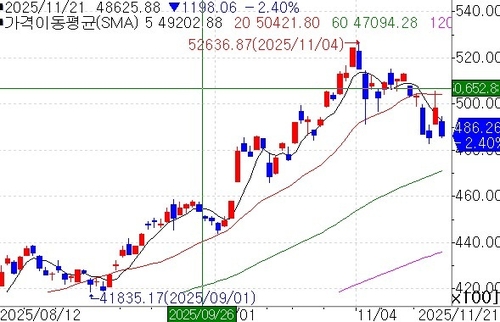(Seoul=Yonhap Infomax) International Economics Department = On the 21st, major Asian equity indices tumbled as concerns over an overheating artificial intelligence (AI) sector triggered a broad sell-off in technology shares.
Markets in Japan, China, Hong Kong, and Taiwan all closed lower.
Japan
Japanese stocks fell sharply, led by technology shares, despite the government’s announcement of a large-scale economic stimulus package.
According to the Yonhap Infomax World Stock Index (6511), the Nikkei 225 closed down 1,198.06 points, or 2.40%, at 48,625.88. The TOPIX index slipped 1.84 points, or 0.06%, to finish at 3,297.73.
After breaking a losing streak with a sharp rally in the previous session, Japan’s main indices reversed course within a day. The Nikkei opened with a 1.15% gap down and quickly deepened losses to over 2%. The TOPIX attempted intraday rebounds but repeatedly met resistance.
Japanese AI and semiconductor-related stocks tracked overnight weakness in US tech shares, dragging the broader market lower. Only select large-cap domestic demand stocks showed resilience.
Off-exchange block and basket trades totaling approximately 69 billion yen were reported shortly after the morning session.
In the afternoon, index futures buying—likely from overseas short-term investors—helped pare some losses in the Nikkei, but renewed selling pressure soon returned, reflecting market instability.
With Japan’s financial markets set to close on the 24th for ‘Labor Thanksgiving Day,’ a variety of trades—including short covering in futures and unwinding of hedges—crossed the market.
The Japanese government set the size of its stimulus package at 21.3 trillion yen ($141.6 billion), the largest since the COVID-19 pandemic. To fund the measures, the government plans to submit a supplementary budget of 17.7 trillion yen.
Prime Minister Sanae Takaichi said, “We will foster a strong economy and boost growth rates, while reducing the government debt-to-GDP ratio and achieving fiscal sustainability to secure market confidence.” However, her remarks failed to reverse the bearish market sentiment.
Economic indicators were mixed. According to S&P Global, Japan’s preliminary November services Purchasing Managers’ Index (PMI) came in at 53.1, remaining in expansion. The manufacturing PMI flash reading fell to 48.8, marking a fifth consecutive month of contraction.
Japan’s trade deficit for October was 231.7 billion yen ($1.54 billion), narrower than the market forecast of a 280 billion yen shortfall.
In the bond market, Japanese government bond yields continued to fall (prices rose) despite the stimulus announcement.
According to Yonhap Infomax overseas rates (screen 6531), the 10-year JGB yield fell 3.45 basis points to 1.7859% at the close. The 30-year yield dropped 5.65 basis points to 3.3249%, while the 2-year yield declined 1.15 basis points to 0.9501%.
Prime Minister Takaichi reassured markets that net JGB issuance, including the supplementary budget, would be lower than last year. “We will utilize increased tax revenue and issue bonds only as needed. The total JGB issuance after the initial and supplementary budgets is expected to be less than last year’s 42.1 trillion yen,” she said at a press conference.
Analysts noted that concerns about additional debt from the stimulus package were already priced in, and global equity weakness increased demand for safe-haven bonds.
“The size of the supplementary budget was already known, and with all factors priced in, bond buying dominated,” said Tomoaki Shishido, chief rates strategist at Nomura Securities.
Meanwhile, credit default swap (CDS) premiums on Japanese government bonds—reflecting sovereign credit risk—jumped, highlighting concerns over fiscal soundness. According to the Nikkei, the 5-year JGB CDS premium rose to 21.73 basis points on the 20th, surpassing the previous high of 21.23 basis points set on October 13.
“Renewed caution over fiscal expansion, especially with the coalition between the Liberal Democratic Party and Japan Innovation Party, and the prospect of increased JGB issuance, are driving up CDS premiums,” said Takanori Sueizawa, analyst at SMBC Nikko Securities.

China
Chinese stocks also declined, tracking global tech weakness amid AI bubble concerns.
According to the Yonhap Infomax World Stock Index (6511), the Shanghai Composite closed down 96.16 points, or 2.45%, at 3,834.89. The Shenzhen Composite fell 84.12 points, or 3.43%, to 2,370.32.
Risk aversion persisted in the Chinese market amid worries over high tech stock valuations. Even Nvidia’s stronger-than-expected earnings failed to dispel AI-related concerns.
Overnight, the Philadelphia Semiconductor Index, which tracks US AI and semiconductor stocks, plunged 4.77%.
This weakness spilled over to Asian markets, with tech shares in South Korea, Japan, and China all under pressure. Chinese tech stocks, which had surged earlier this year, faced profit-taking and selling pressure. The Shanghai Composite is up about 18% year-to-date.
The CSI AI Index dropped as much as 3.5% intraday, while the CSI Semiconductor Index fell 3.1%.
Morgan Stanley noted, “Year-end market sentiment has weakened due to reduced risk appetite and recent disappointing economic data.”
Rising geopolitical tensions between China and Japan also weighed on sentiment. After Japanese Prime Minister Sanae Takaichi became the first sitting Japanese leader to suggest possible intervention in a Taiwan contingency on November 7, both countries escalated their rhetoric. China responded by advising its citizens to avoid travel and study in Japan, delaying Japanese film releases, and suspending imports of Japanese seafood.
Prime Minister Takaichi reiterated that her views on the direction of China-Japan relations, as confirmed in last month’s summit with President Xi Jinping, remain unchanged. “At the end of last month, President Xi and I reaffirmed our commitment to a comprehensive strategic and mutually beneficial relationship and to building a constructive and stable relationship. This position has not changed,” she said.
The People’s Bank of China (PBOC) set the yuan stronger, fixing the USD/CNY reference rate at 7.0875, down 0.0030 yuan (0.04%) from the previous session.
Hong Kong
Hong Kong stocks followed the mainland lower. The Hang Seng Index fell 615.55 points, or 2.38%, to 25,220.02. The Hang Seng China Enterprises Index dropped 223.56 points, or 2.45%, to 8,919.78.
Taiwan
Taiwanese shares also declined. The Taiex closed down 991.42 points, or 3.61%, at 26,434.94. Market heavyweight TSMC fell 4.81%.
(End)
Copyright © Yonhap Infomax Unauthorized reproduction and redistribution prohibited.

